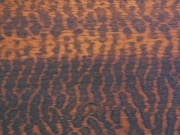Difference between revisions of "Snakewood"
(username removed) |
|||
| (7 intermediate revisions by 2 users not shown) | |||
| Line 2: | Line 2: | ||
== Description == | == Description == | ||
| − | A highly patterned wood obtained from ''Piratinera guianensis'' trees that are native to West Indies and northern regions of South America. Snakewood is heavy with a fine uniform texture. Although the grain is straight, the wood has a distinct yellow, dark red, and brown mottled pattern that resembles [ | + | A highly patterned wood obtained from ''Piratinera guianensis'' trees that are native to West Indies and northern regions of South America. Snakewood is heavy with a fine uniform texture. Although the grain is straight, the wood has a distinct yellow, dark red, and brown mottled pattern that resembles [[snakeski|snakeskin]]. Snakewood was popluar for [[veneer|veneers]] in the late 18th century. The durable wood is still used for stringed instrument bows, veneers, walking sticks, and modeling tools. The terms "letter wood" in English or "bois de lettre" in French have for origin the use of this wood by the Jesuits in South America for manufacturing wooden block capitals. |
== Synonyms and Related Terms == | == Synonyms and Related Terms == | ||
| − | ''Piratinera guianensis''; letterwood; letter wood; leopard wood; tortoiseshell wood; bois d'amourette | + | ''Piratinera guianensis''; letterwood; letter wood; leopard wood; tortoiseshell wood; bois d'amourette; bois de lettre (Fr.) |
| − | + | ==Physical and Chemical Properties== | |
| − | |||
| − | |||
| − | |||
| − | |||
| − | == | + | * Density = 80 ppcf |
| + | |||
| + | ==Resources and Citations== | ||
* Ralph Mayer, ''A Dictionary of Art Terms and Techniques'', Harper and Row Publishers, New York, 1969 (also 1945 printing) | * Ralph Mayer, ''A Dictionary of Art Terms and Techniques'', Harper and Row Publishers, New York, 1969 (also 1945 printing) | ||
| Line 21: | Line 19: | ||
* George Savage, ''Art and Antique Restorer's Handbook'', Rockliff Publishing Corp, London, 1954 | * George Savage, ''Art and Antique Restorer's Handbook'', Rockliff Publishing Corp, London, 1954 | ||
| + | |||
| + | * http://www.guyane-bois.net/pageLibre000103b1.aspx | ||
[[Category:Materials database]] | [[Category:Materials database]] | ||
Latest revision as of 13:42, 31 May 2022
Description
A highly patterned wood obtained from Piratinera guianensis trees that are native to West Indies and northern regions of South America. Snakewood is heavy with a fine uniform texture. Although the grain is straight, the wood has a distinct yellow, dark red, and brown mottled pattern that resembles snakeskin. Snakewood was popluar for veneers in the late 18th century. The durable wood is still used for stringed instrument bows, veneers, walking sticks, and modeling tools. The terms "letter wood" in English or "bois de lettre" in French have for origin the use of this wood by the Jesuits in South America for manufacturing wooden block capitals.
Synonyms and Related Terms
Piratinera guianensis; letterwood; letter wood; leopard wood; tortoiseshell wood; bois d'amourette; bois de lettre (Fr.)
Physical and Chemical Properties
- Density = 80 ppcf
Resources and Citations
- Ralph Mayer, A Dictionary of Art Terms and Techniques, Harper and Row Publishers, New York, 1969 (also 1945 printing)
- F. H. Titmuss, Commercial Timbers of the World, The Technical Press Ltd., London, 1965
- George Savage, Art and Antique Restorer's Handbook, Rockliff Publishing Corp, London, 1954
